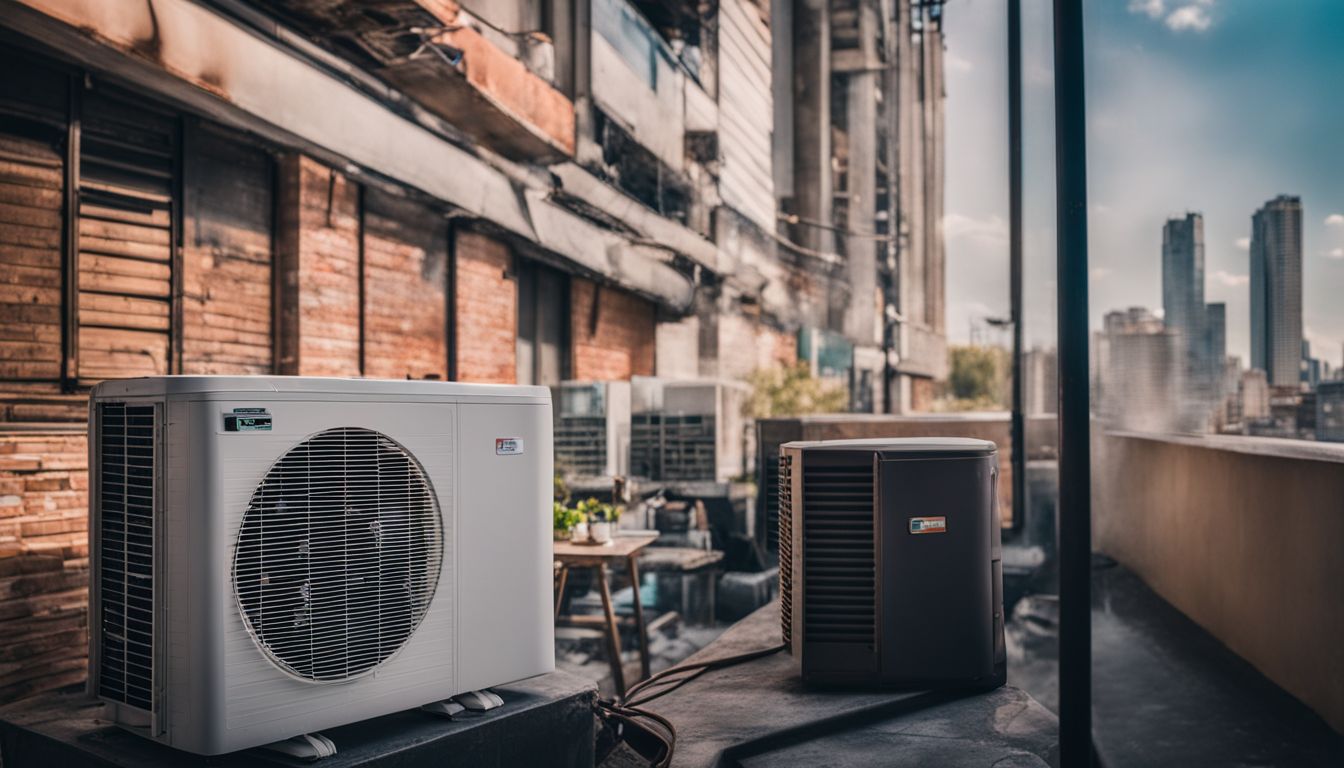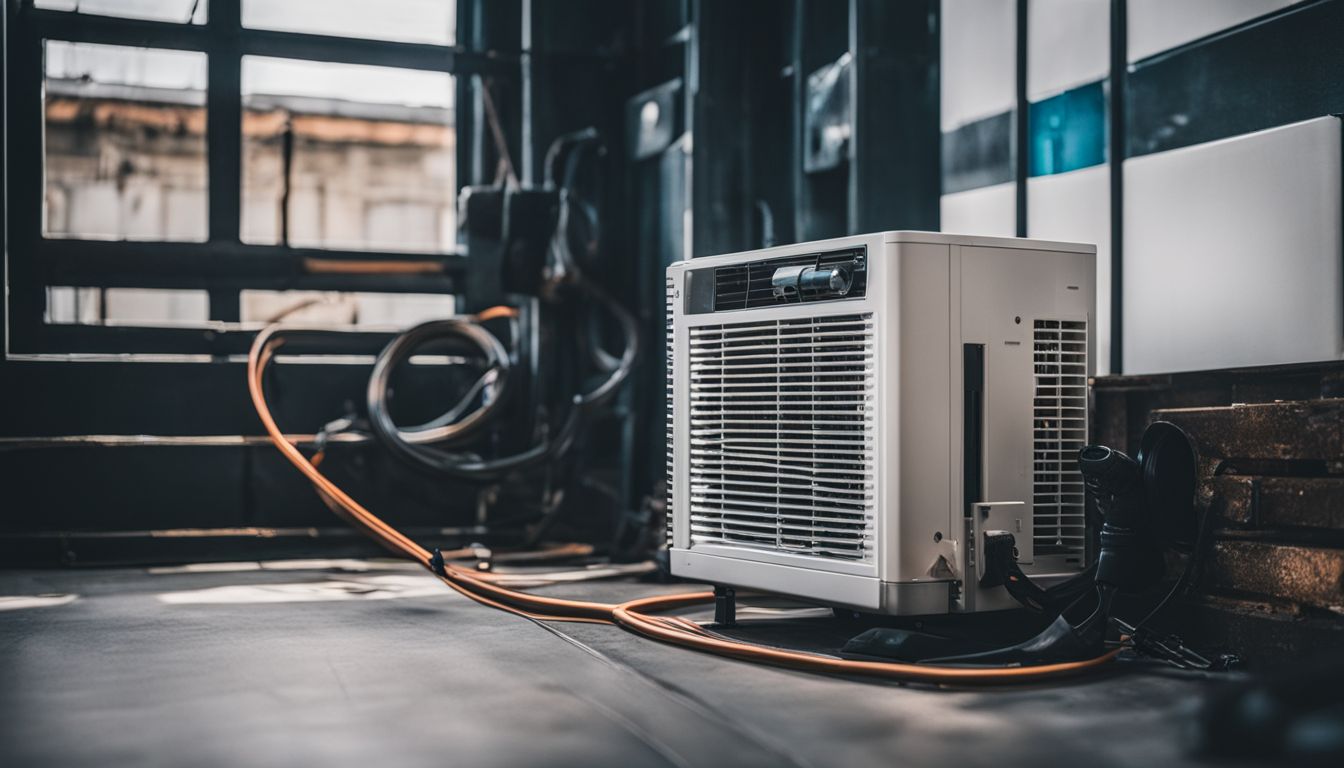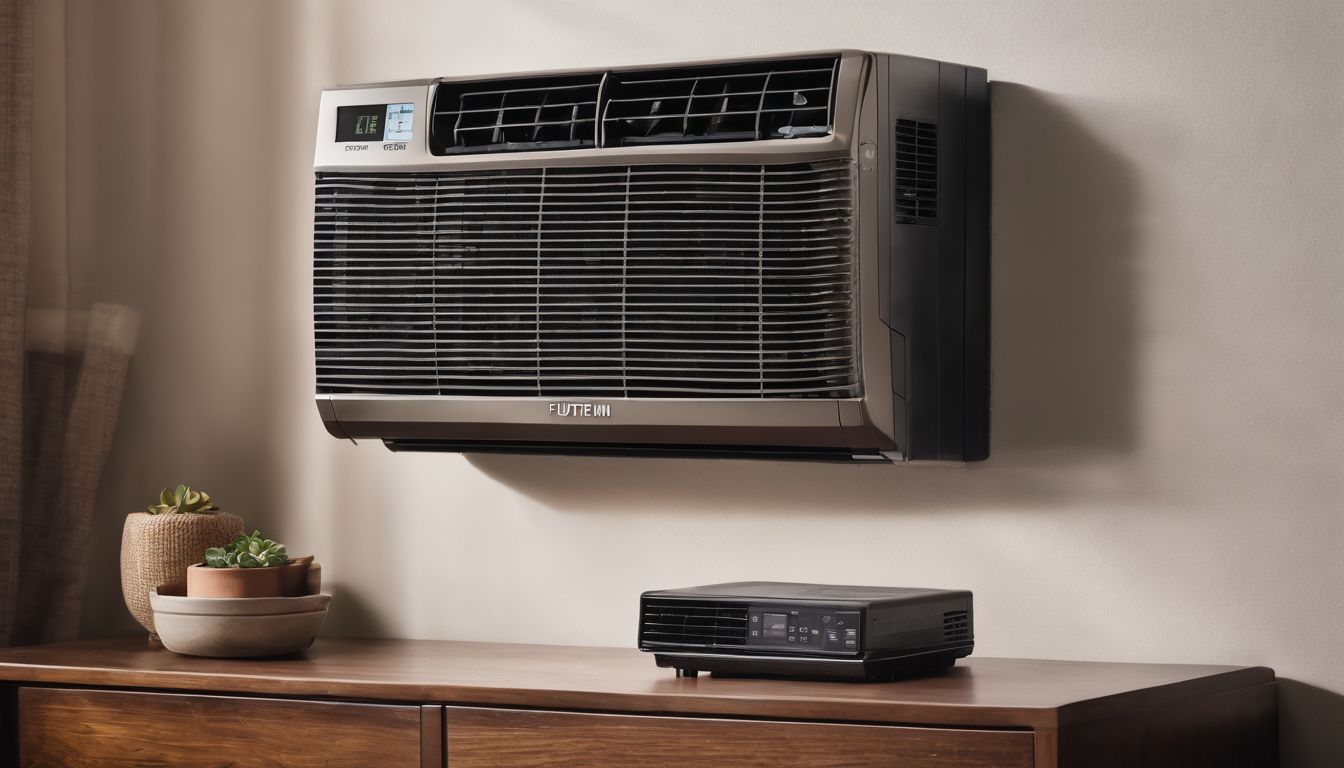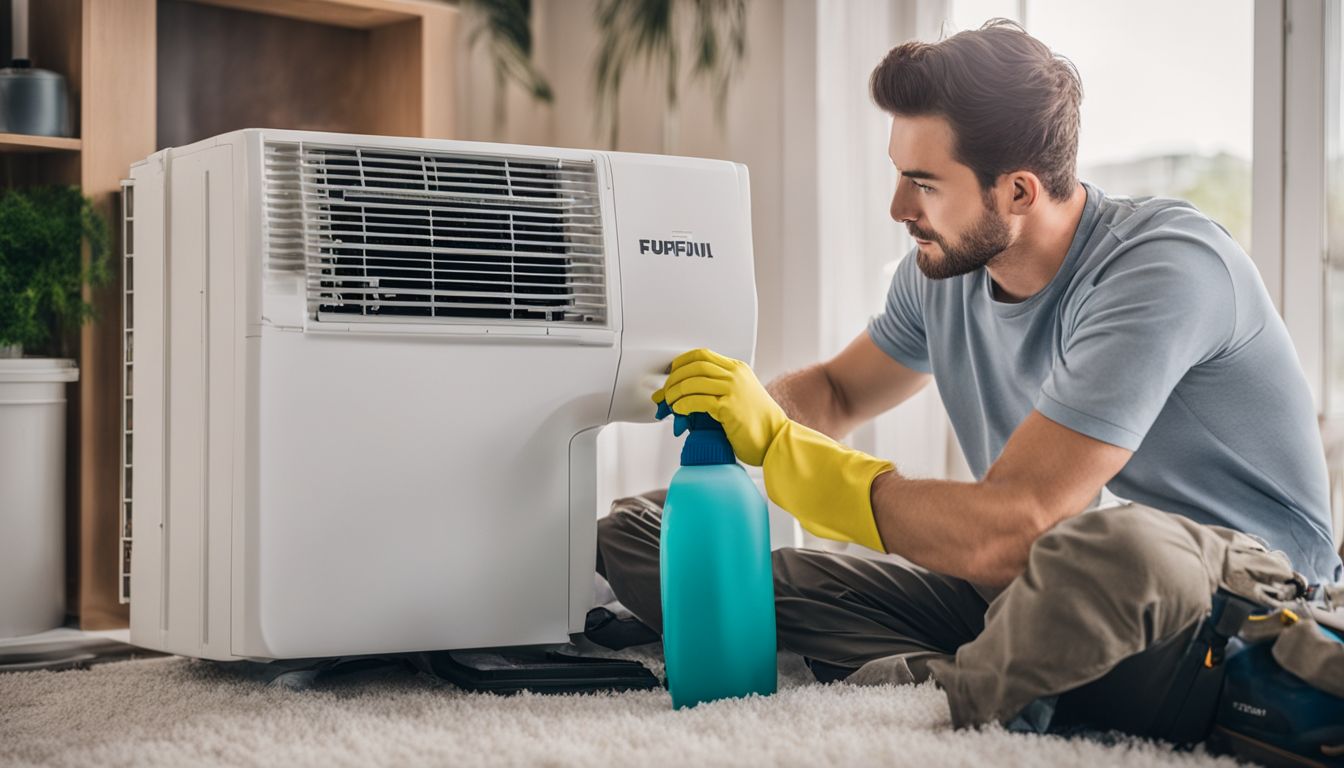Air conditioners often break down when we need them most, leaving us hot and bothered. A clogged filter alone can push your AC to work too hard, leading to troubles. Our guide sheds light on key steps you can take to stop breakdowns before they start, keeping your cool air flowing smoothly.
Discover easy preventive measures that make a big difference!
Common Causes of Aircon Breakdowns
Dirty air filters are a notorious culprit in the malfunctioning of air conditioning systems. They restrict airflow, forcing the system to strain and often resulting in breakdowns. Regularly changing or cleaning these filters is crucial for maintaining smooth operation.
Refrigerant leaks significantly impair an AC unit’s ability to cool your home effectively. Detecting and repairing these leaks early on prevents further complications with the cooling system.
Faulty thermostats can also lead to inconsistent temperatures and cause undue stress on the HVAC equipment.
Clogged drains add another layer of trouble, leading to water leaks and potential damage to your property. The excess moisture from a blocked drain can also decrease indoor air quality, fostering mould growth within the system.
Electrical issues should never be overlooked as they can pose serious risks. Worn-out contractors or frayed wires disrupt power flow to important components like motors and compressors, which may halt air conditioning operations entirely.
Lastly, neglected routine maintenance sets the stage for preventable HVAC problems. A regular check-up by professionals ensures that all parts function optimally and any emerging issue gets addressed before it escalates into a full-blown breakdown.
Essential Preventive Measures for Future Aircon Breakdowns
To stave off future aircon malfunctions, proactive steps are paramount. It’s vital to engage in consistent upkeep and adopt vigilant care habits for your cooling system—actions that not only enhance performance but also extend its lifespan.
Regular Maintenance and Tune-ups
Keeping your air conditioning unit in top shape requires regular maintenance and tune-ups. Think of it as giving your car a service to ensure everything’s running smoothly; the same goes for your HVAC system.
Scheduled check-ups by a professional can catch small issues before they turn into big problems, conserving energy and saving you money on future costly repairs.
During these tune-ups, technicians will inspect all components, from evaporator coils to condenser coils, guaranteeing efficient air circulation. They’ll replace any worn parts, such as filters and fuses, ensuring that your system operates at its peak performance.
This not only sustains optimal energy efficiency but also helps maintain the quality of indoor air. Regular servicing keeps every part of the system clean and functioning properly, setting the stage for reliable heating and cooling throughout the seasons without unexpected interruptions or breakdowns.
Proper Cleaning of External and Internal Units
Proper cleaning of external and internal units is a crucial step in maintaining your air conditioning system. Start with the external unit by carefully removing leaves, twigs, and other debris that can obstruct airflow.
Use a gentle water stream to wash away any accumulated dirt without harming delicate components. Ensure you clean around the coil area and keep plants trimmed back by at least 2 feet to guarantee efficient air circulation.
For the internal parts, focus on dusting off the evaporator coil regularly as it’s prone to collecting dirt over time despite having a clean filter. This not only keeps your HVAC unit running smoothly but also helps in achieving better energy efficiency.
Remember: an unattended aircon can lead to malfunctions, so make these cleaning practices routine for seamless operation and performance longevity of your cooling systems.
Timely Replacement of Filters
Changing your air conditioner’s filters regularly keeps the air in your home clean and ensures your system runs efficiently. Dust particles and allergens are trapped by filters, improving the indoor air quality dramatically.
If you let these filters get clogged, not only does it become difficult for air to circulate properly but it also makes your unit work harder than necessary. This extra strain can lead to premature breakdowns and unwanted repair bills.
Make a habit of checking your air conditioning filters every month, especially during high-usage periods. Dirty filters should be replaced without delay to prevent issues that could interrupt climate control in your home.
Simple tasks like filter replacement play a significant role in maintaining an energy-efficient household and can contribute to reducing overall energy consumption while extending the lifespan of HVAC systems.
The Role of Proper Installation and Size in Preventing Breakdowns
Ensuring an air conditioner is installed correctly can make a world of difference to its performance and longevity. Skilled technicians should handle the setup to guarantee that every component functions as it should, reducing the risk of malfunctions later on.
This means securing all connections tightly, setting up the thermostat accurately, and making sure the system is balanced for optimal airflow.
Selecting the right size unit for your space is equally vital in warding off breakdowns. A too-small AC will run continuously, struggling to cool down a large area which can lead to overheating and eventual failure.
Conversely, an oversized system cycles on and off too frequently causing unnecessary wear on components. Matching the correct size with your room assures efficient operation and prevents stress on your air conditioning system, helping it last longer without issues.
Preventing Refrigerant Leaks
Regular maintenance plays a crucial role in preventing refrigerant leaks. This involves checking and securing mechanical joints, inspecting lines for wear and tear, and ensuring seals are tight.
Technicians should trace the entire system during routine checks to spot any potential weaknesses before they turn into major problems.
Cleanliness within refrigeration racks and mechanical rooms helps detect leaks early on. Dust and debris can conceal issues that might lead to leakage; therefore, keeping these areas clean is essential.
Scheduling professional inspections regularly aids in catching small leaks before they escalate, safeguarding both the air conditioning unit’s efficiency and its impact on energy savings.
The Importance of Regular Maintenance and Cleaning of the Air Conditioning System
Keeping your air conditioning system in top shape isn’t only about comfort; it’s crucial for the appliance’s longevity and efficiency. Dust, pollen, and other airborne particles get trapped in filters and air ducts over time.
If you don’t clean these components regularly, airflow becomes restricted, forcing the system to work harder. This not only wears out parts faster but also hikes up energy bills due to decreased efficiency.
Scheduling maintenance visits from qualified technicians is an excellent way to catch small problems before they escalate into bigger ones. They’ll check coolant levels, inspect electrical connections, and ensure that all moving parts are lubricated.
In addition to maintaining system health, this proactive approach can avert unexpected breakdowns that disrupt daily life and lead to costly emergency repairs. Cleaner units also translate into fresher air indoors – a bonus for allergy sufferers or anyone looking for a more comfortable living environment.
When to Consider Repairing vs. Replacing Your Air Conditioner

Deciding between repairing or replacing your air conditioner depends on several factors, such as age, efficiency, and frequency of breakdowns. If your unit is more than ten years old and repairs are becoming a frequent necessity, it’s time to weigh the costs.
Repair bills can add up quickly; if they start totalling close to half the price of a new system, investing in an upgrade makes financial sense. An energy-efficient model not only lowers energy bills but also provides reliable cooling.
Modern air conditioners boast higher SEER ratings which translate to better energy savings over time. They often come with features like smart thermostats that help manage usage for further reduced energy consumption.
On the other hand, minor issues like a dirty filter or faulty thermostat are typically quick fixes that won’t break the bank. Always consult with a certified technician who can guide you through these decisions by thoroughly inspecting your current system and projecting future performance based on its condition.
Using Smart Thermostats or AC Controllers for Secure Aircon Usage
Smart thermostats and AC controllers can take your air conditioning to the next level by ensuring efficient energy use and preventing wear and tear. They allow you to adjust settings from anywhere, meaning you can cool down your house just before you get home without leaving the AC running all day.
These gadgets learn your schedule and preferences, automatically adjusting for optimal comfort while cutting down on unnecessary cooling when nobody’s home.
Installing a smart thermostat is straightforward and makes keeping an eye on your system a breeze. Alerts about extreme temperatures or irregularities in performance help catch issues early, avoiding major breakdowns.
You save money not only by reducing energy consumption but also by extending the life of your air conditioning units through better management of their operation times. Smart controllers like Sensibo Air even include features such as geofencing which activate your air conditioning based on your smartphone location, ensuring that it’s only working when it needs to be.
The Impact of Right-Size AC for Room Size on Preventing Breakdowns
Selecting the right-sized air conditioner for a room can significantly influence its performance and durability. An oversized AC will cycle on and off too frequently, which puts extra strain on the unit, leading to potential breakdowns over time.
Constant cycling also fails to dehumidify the air effectively, leaving your space feeling clammy and uncomfortable. On the other hand, an undersized system has to work harder to cool a room, causing excessive wear and tear that can shorten its lifespan.
Choosing an air conditioner with appropriate cooling capacity ensures it runs efficiently without overexertion or energy wastage. This balance keeps internal components from being overstressed which reduces maintenance calls and prolongs unit life expectancy.
Optimal sizing matched with regular preventive maintenance helps maintain a consistent temperature while avoiding common mechanical issues that lead to failures in heating and air conditioning systems.
Selecting the right-sized air conditioner for a room can significantly influence its performance and durability. An oversized AC will cycle on and off too frequently, which puts extra strain on the unit, leading to potential breakdowns over time.
Constant cycling also fails to dehumidify the air effectively, leaving your space feeling clammy and uncomfortable. On the other hand, an undersized system has to work harder to cool a room, causing excessive wear and tear that can shorten its lifespan.
Choosing an air conditioner with appropriate cooling capacity ensures it runs efficiently without overexertion or energy wastage. This balance keeps internal components from being overstressed which reduces maintenance calls and prolongs unit life expectancy.
Optimal sizing matched with regular preventative maintenance helps maintain a consistent temperature while avoiding common mechanical issues that lead to failures in heating and air conditioning systems.
Basic Troubleshooting for Common Aircon Issues
Master the art of quickly addressing everyday aircon troubles with our guide on basic troubleshooting, and ensure your system remains in peak condition year-round.
AC Not Blowing Cold Air
If your AC is not blowing cold air, a dirty or clogged air filter could be the culprit. Regular cleaning or replacing of filters is essential to maintain airflow and keep your room chilled.
Refrigerant issues are another common problem; if levels are low or there’s a leak, the unit can’t cool the air effectively. It’s crucial to address these refrigerant concerns promptly to prevent further damage.
Other components like evaporator coils, condensers, and compressors play significant roles in cooling. If they fail, you’ll feel warmth instead of refreshing cold air. Scheduling regular maintenance checks ensures these critical parts function correctly.
Watch out for electric control failures and sensor glitches that might disrupt your system’s operation – preventative measures will save you from sweltering heatwaves.
Ignoring thermostat settings can lead to unexpected warmth from vents when you’re craving coolness. Make sure it’s set right for icy blasts rather than lukewarm breezes. Drainage problems also contribute to inefficient cooling; keeping an eye on this will help preserve that brisk indoor climate even during scorching months.
Lastly, never underestimate the impact of routine care; it keeps every part of the AC in tip-top shape so you can enjoy uninterrupted comfort all season long.
Freezing Up During Winter
Air conditioners aren’t just for summer; they can freeze up in the chill of winter too. Low refrigerant levels make it hard for your unit to operate properly, causing ice to form on the coils.
This is even more likely if you’ve got a buildup of dust and pet hair blocking airflow.
To prevent this icy problem, check and replace your air filters regularly. Make sure that all fans and components are working well, which helps maintain steady airflow over the coils.
A clean filter not only stops freezing but also keeps your machine running smoothly throughout cold months. Regular inspections will spot any potential issues before they lead to a frosty breakdown.
Checking the Refrigerant Level
Ensure your aircon is running smoothly by checking its refrigerant level regularly. Low levels can lead to reduced cooling efficiency, causing your energy bills to soar and possibly freezing up your coils.
Such symptoms signal the need for immediate attention as they could indicate a leak or other issues within the system.
A professional should do this task; they will inspect for leaks and top off the refrigerant if necessary. Maintaining optimal levels helps prevent damage and keeps your air conditioning unit working at peak performance.
Avoid letting low refrigerant cause bigger problems down the line by incorporating these checks into your routine preventive maintenance schedule.
Advanced Aircon Features and Their Role in Preventing Breakdowns

Embracing advanced aircon features such as convertible modes and PCB technology can significantly bolster your system’s resilience, reducing the likelihood of inconvenient breakdowns.
These cutting-edge functionalities not only enhance operational efficiency but also offer predictive maintenance alerts that preempt potential issues before they escalate.
Convertible Air Conditioners
Convertible air conditioners stand out with their smart sensors and advanced control schemes. This technology allows for precise cooling, adjusting temperatures to match your comfort levels while optimising energy use.
The innovative compressor in these units can change its frequency based on the environment, which cuts down on power consumption and boosts overall efficiency.
Opting for a convertible air conditioner not only provides a more adaptable cooling solution but also contributes to fewer breakdowns over time. Their high-tech approach to temperature regulation mirrors systems found in automotive air conditioning, ensures that your indoor climate is consistently comfortable without straining the unit.
Such benefits make convertible ACs a solid investment towards maintaining an efficient and reliable air-conditioning system.
AC with PCB Technology
Modern air conditioners often come equipped with PCB technology, which stands for printed circuit board. This state-of-the-art component is vital for the sophisticated management of your AC’s functions.
It controls key operations like compressor activity and temperature settings, ensuring your unit runs smoothly and efficiently. Given its central role, a malfunctioning PCB can cause major disruptions to how your air conditioner performs.
Investing in an air conditioning unit that features advanced PCB technology could prevent future breakdowns and save on repair costs. These smart-systems adjust cooling power to match room conditions accurately, thus reducing unnecessary strain on the system.
Enhanced control mechanisms from these boards mean better performance from your HVAC units while also promoting energy savings—a big plus for both the environment and your wallet.
How to Lower Energy Bills with Efficient AC Use
Regularly cleaning AC filters is essential for saving energy and improving performance. A clogged filter forces air conditioners to work harder, using more electricity. Ensure you wash or replace filters as needed to keep your cooling system running optimally.
Smart thermostats can also make a big difference in managing energy consumption. They adapt to your schedule, adjusting temperatures when you’re away or asleep, leading to significant cost savings.
Sealing gaps and cracks in the home prevents cool air from slipping out, which means your AC won’t have to run as often. Adding weather stripping around doors and windows helps maintain a consistent temperature without overworking the system.
Consider changing the air filter every six months – not only does this promote efficient operation but it also supports clean indoor air quality. Set the thermostat according to outside weather; sometimes a slight adjustment can result in noticeable energy savings without compromising on comfort levels.
Conclusion
Taking charge of your air conditioning’s health is not only practical but ensures a smooth, cool summer. Engage in annual check-ups and keep those filters clean to avoid unexpected hitches.
Embrace technology with smart thermostats for efficient cooling control. Remember, attention to detail today saves you from the heat tomorrow. Look after your aircon diligently, and it will return the favour on sweltering days.
FAQs
1. What are the benefits of using programmable thermostats for air conditioners?
Programmable thermostats help make your air conditioning units more energy efficient by adjusting temperatures according to preset schedules.
2. How often should I perform preventative maintenance on my aircon?
Regular preventative maintenance, like filter replacement and debris removal from air vents, can keep different types of air conditioners, including central and mini-split systems, running smoothly.
3. Can smart technology improve my air conditioner’s performance?
Absolutely! Smart home tools and IoT devices such as internet-connected thermostats allow for voice control through platforms like Amazon Alexa, contributing to a green lifestyle by reducing standby power consumption.
4. Why is cleaning important in preventing future breakdowns of my HVAC system?
Keeping components such as the tumble dryer, washing machine, humidifiers and especially the parts within your heating ventilation and air conditioning (HVAC) system clean ensures efficiency and avoids unnecessary pressure on the system that could lead to breakdowns.
5. Does natural light affect how my room or portable air conditioner works?
Yes indeed! More natural light in rooms can increase temperature which makes room or portable air conditioners work harder; hence controlling sunlight with shades or curtains can enhance energy efficiency.
6. What spare parts should I have on hand for quick repairs to avoid downtime of my AC unit?
Having spare printed circuit boards for control mechanisms and extra filters helps maintain uninterrupted operations of your split-system or central air-conditioner unit ensuring they are always ready to provide cool comfort without delays due to malfunctions.





